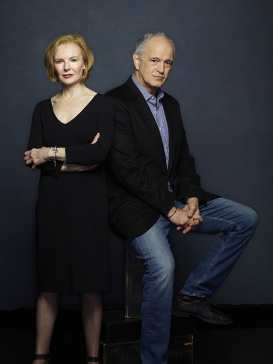WGBH’s Jim Braude and Margery Eagan to moderate panel on breast cancer prevention at Silent Spring Institute’s October 18 gala celebration
 Despite medical advances over the last three decades, why is that incidence rates of breast cancer in the United States have remained largely unchanged? And what can we do about it? WGBH’s Jim Braude and Margery Eagan will take on these big questions at Silent Spring Institute’s annual gala on breast cancer prevention, on October 18 at the Royal Sonesta Hotel in Cambridge, Mass. Proceeds from the event will go towards supporting the Institute’s innovative research on the environmental causes of breast cancer and its groundbreaking work on prevention science.
Despite medical advances over the last three decades, why is that incidence rates of breast cancer in the United States have remained largely unchanged? And what can we do about it? WGBH’s Jim Braude and Margery Eagan will take on these big questions at Silent Spring Institute’s annual gala on breast cancer prevention, on October 18 at the Royal Sonesta Hotel in Cambridge, Mass. Proceeds from the event will go towards supporting the Institute’s innovative research on the environmental causes of breast cancer and its groundbreaking work on prevention science.
“Breast cancer is the most commonly diagnosed cancer in the United States, far surpassing lung cancer, yet as a nation we invest so little in preventing women from getting the disease in the first place,” says Eagan, who co-hosts Boston Public Radio with Braude on WGBH 89.7FM. “Silent Spring Institute is one of the few scientific research organizations working to find solutions to this stubborn public health crisis.”
During the dinner event, Eagan and Braude will lead a lively and engaging discussion on the topic, featuring a panel of leading experts in the field. The panelists include: Ruthann Rudel, Silent Spring’s director of research and expert toxicologist; Tamarra James-Todd, an epidemiologist at the Harvard T.H. Chan School of Public Health; and Lisa J. Goodwin Robbins, a registered architect at Kalin Associates who specializes in healthier buildings. Eagan and Braude will field questions from the audience.
The discussion will center on Silent Spring’s Pathway to Prevention, the organization’s bold strategy for reducing the incidence of breast cancer by identifying cancer-causing chemicals where we live, work, and play, and working with partners to create safer products and stronger policies that protect consumers from hazardous chemicals.
“We can no longer ignore the growing body of evidence that hazardous chemicals in our everyday environments play an important role in the development of breast cancer,” says Rudel. “By working with health professionals, lawyers, building experts, advocates, and policymakers, we can ensure that our science has impact,” says Rudel.
The institute’s research and expert testimony on hazardous flame retardant chemicals in furniture was instrumental last year in leading the U.S. Consumer Product Safety Commission to vote to ban an entire class of toxic flame retardants from consumer products. A recent bill signed by Governor Charlie Baker to designate cancer as a work-related injury for firefighters in Massachusetts drew on Silent Spring’s research in its inclusion of breast and reproductive cancers to protect female firefighters.
The gala event will also include remarks from Dr. Julia Brody, Silent Spring’s executive director and senior scientist. Dr. Brody will give a brief update on the organization’s research, including a recent study in which scientists found hair products marketed to Black women contain a mix of hazardous ingredients.